Is there something special about the way cats sleep? How do cats behave when they’re sleeping? Why do they
spend so much time sleeping? Do cats dream?
Which activity do our feline friends devote most of their time to? You guessed it, sleeping. When it comes to lying around and lazing about, these kitties are masters of their trade! There are twenty-four hours in a day, and cats spend a majority of those hours sleeping. Is this normal? Are our cats constantly are tired or is there some other reason why they love to sleep so much? Are all cats natural born sleepers who snooze the day away or are there exceptions to the rule?
Why do cats sometimes twitch and meow in their sleep? What do these sounds and movements mean? Do cats dream like we humans do? And can they also suffer from sleep disorders and a general lack of sleep?
When do cats sleep and for how long?
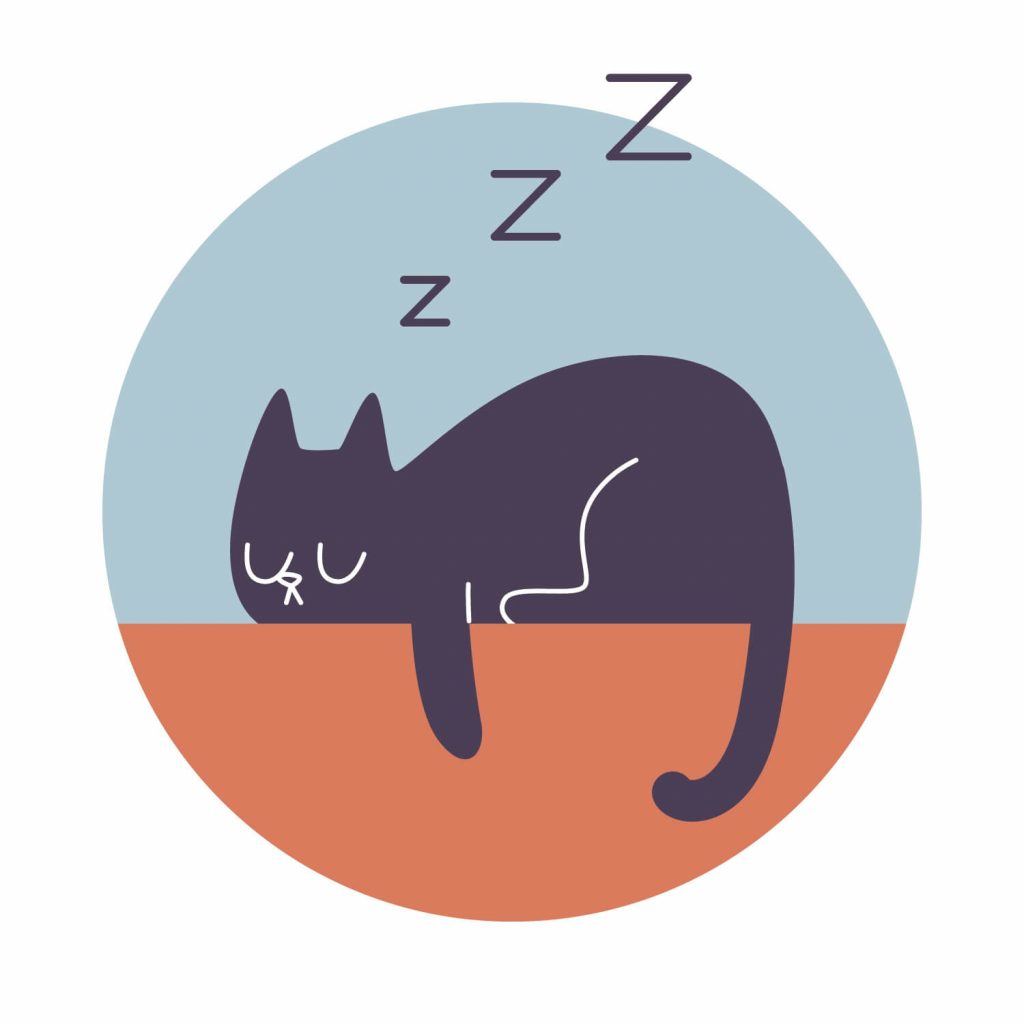
A number of factors determine when a cat will want to sleep and for how long. How old is your cat? Is it a
stay-at-home cat or does it go outside on a regular basis? What’s the weather like outside and how warm or cold
is it in their surroundings? What about the areas where the cat likes to sleep? Is the cat able to retreat to a space where it can sleep in peace? Or does it live in a stressful environment with no safe space to relax in? Cats are also known to have personal preferences: for example, there are calmer cat breeds and more active ones. In other words, the need for sleep can be very different from cat to cat.
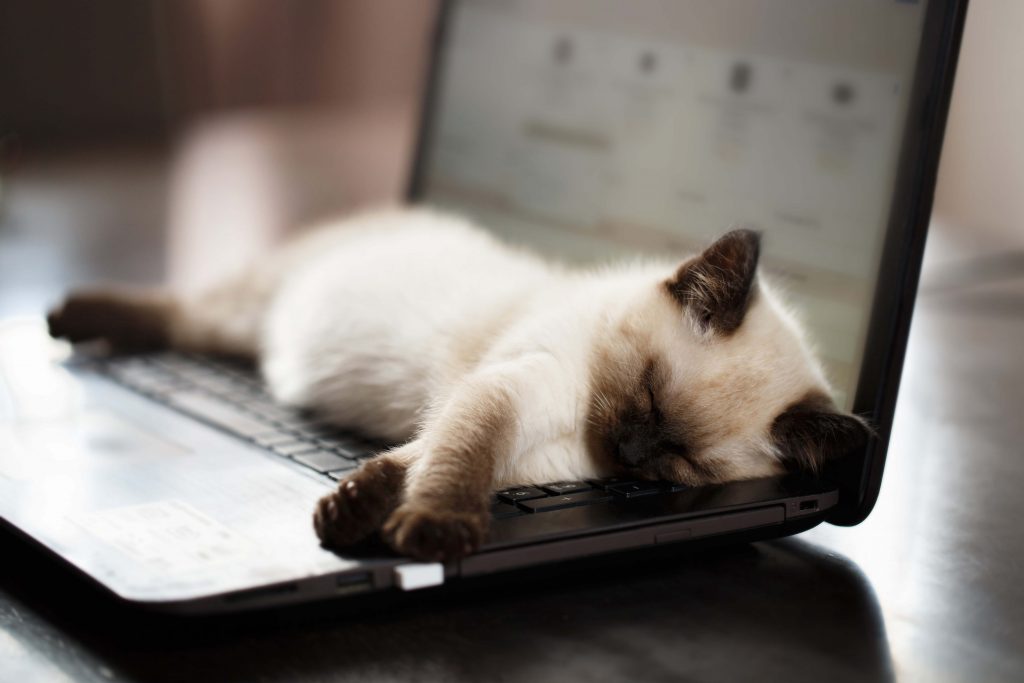
Why do cats sleep so much?
The reason cats sleep so much is because they’re predators. They’re known to nap for a total of 12 to 16 hours a day, sometimes even longer. Why do they need so much sleep? It has a lot to do with the way-of-life of carnivores. Compared to herbivores, carnivores have fewer mortal enemies, which means they don’t have to spend as much time hunting for their food. It’s also possible for good feline hunters to live off their prey for a while, so they don’t have to go hunting again straight away. And since they hardly have to worry about being surprised by enemies while they’re sleeping, they can take long naps. This rest is absolutely necessary for cats, because hunting is very exhausting.
When do cats sleep the most?
Cats sleep the most when their owners are active. When you go to bed, that’s when they really get going! Early in the morning or in the evening, when it starts to get dark, cats will often go out and hunt. All that climbing, jumping, lurking, pouncing and holding on to prey requires the cat to make use of all of its senses and all of its energy. Surprisingly, the act of tracking down prey costs these furry tigers more energy than actually stalking and killing the prey. Once cats have caught and eaten their prey, they like to take a break to digest and replenish their stores of energy.
NOTE:
Cats sleep the most during the day. It’s normal for them to sleep a lot – up to 16 hours a day! When cats sleep, they’re basically recharging their batteries for the next hunt. They’re fully aware that only a
well-rested hunter will be able to track down and capture their fast-moving prey.
How long do kittens sleep?
Kittens sleep even longer than adult cats, at least at the beginning. Like human babies, newborn kittens basically sleep around the clock during their first few weeks of life. In other words, these tiny creatures tend to spend more than 20 hours sleeping! They basically only wake up briefly to drink milk, at which point they snuggle up to their mother and siblings and eventually fall back asleep. And this is a good thing! It’s very important for the little ones to get enough sleep so that they can grow and flourish. This is why you should make sure not to disturb kittens when they’re sleeping! Even though these little fur balls are irresistibly cute, you should always leave them alone when they’re sleeping. Don’t pick them up and generally try to avoid waking them up in the first place. They need their sleep!
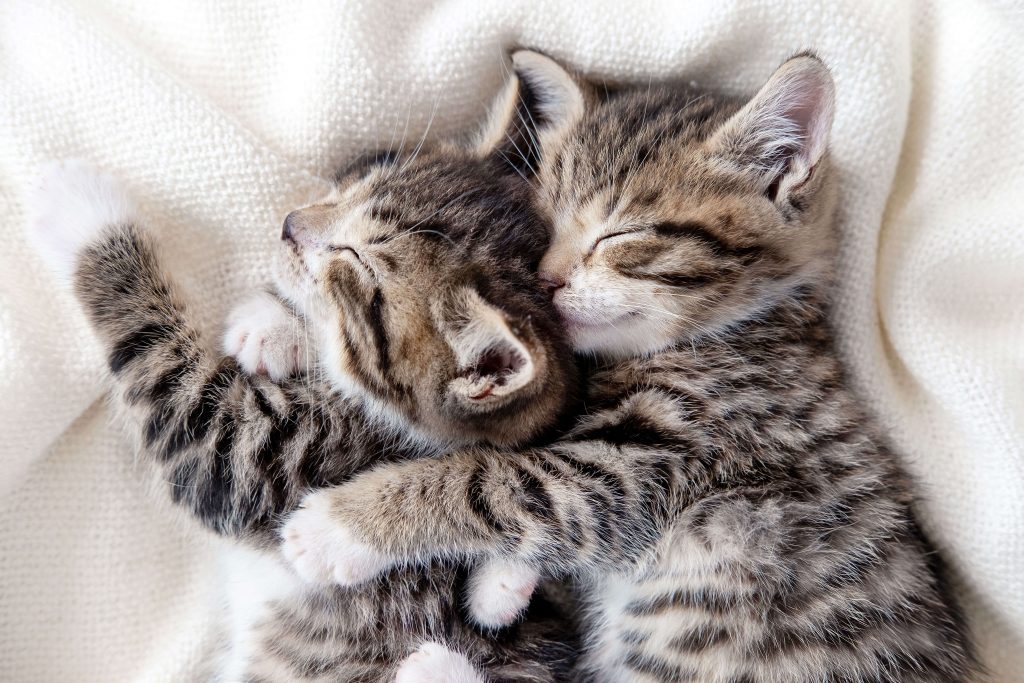
How many hours should a cat sleep in a day?
Adult cats should sleep an average of roughly 12 to 16 hours a day. However, these numbers can vary, and your cat might need more or less sleep depending on its age, health, activity level and environment. Make sure your feline friends always have a safe place to sleep where they can find some true peace and quiet. Your cat’s sleeping areas should be comfortable, preferably with some kind of soft padding. These areas should also be located in different places in your home, so that your cat has a selection of spots to choose from. Felines love to be cosy and warm, which means that sunny spots are very popular with most of them! During darker and colder seasons, a sweet spot near some kind of heat source will also do the
trick …
Understanding your cat’s behaviour when it’s sleeping
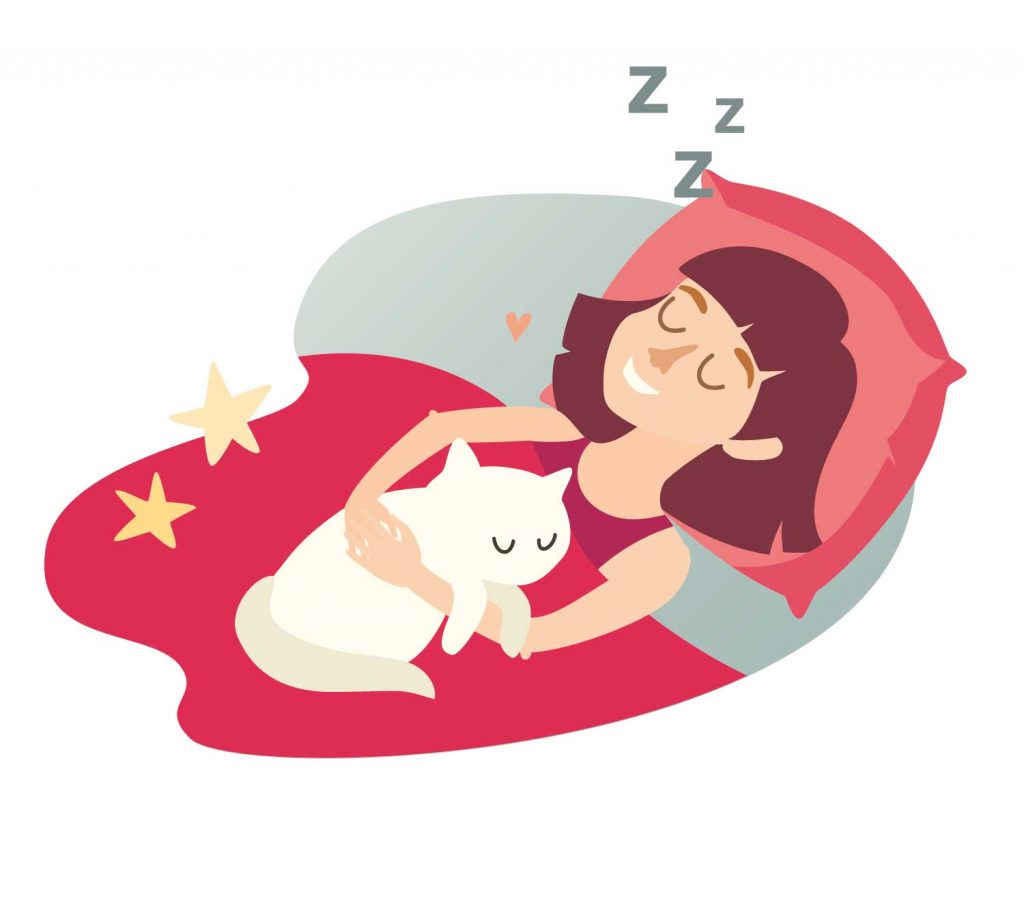
Cats exhibit a variety of very different behaviours when they’re sleeping. Sometimes they curl up into a ball and create a kind of “cat snail”. In this snail form, the cat’s body has the least possible surface area exposed,
which means that less heat is dissipated into the environment. In this curled-up position, the cat’s body also offers less surface area for potential enemies to attack. The most vulnerable parts of their body (the nose and stomach) are well covered and perfectly protected. Some cats like to lay their head on a slightly elevated object when they’re sleeping; this could be an actual pillow or just the cat’s own front or hind legs. Our feline friends are so agile that they can build a castle out of their own little legs!
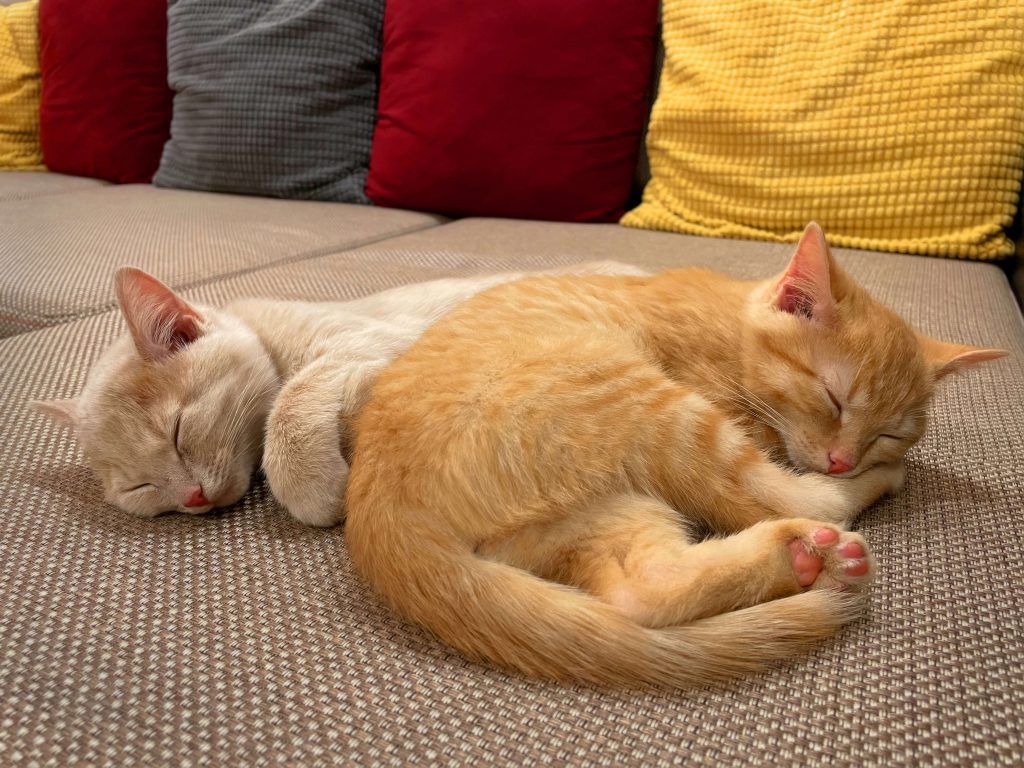
What does it mean when your cat twitches in its sleep?
If your cat twitches occasionally while it’s sleeping, there’s no need to worry! In your cat’s natural sleep cycle, this kind of involuntary muscle twitching occurs mainly in the shorter REM phases that follow the NREM sleep stages. This is the phase where cats often have their most vivid dreams. When you see your cat twitching, it just means they’re “living” the events in these vivid dreams, even though they’re actually fast asleep. In other words, there’s a lot going on in your cat’s brain during this phase. Their nerve cells are transmitting a great deal of stimuli to particular regions of their brain, which then pass the information on to the body. As a result, your cat’s eyelids, lips, legs and tail may twitch briefly. These aren’t conscious movements, they’re all completely involuntary.
What does it mean when your cat meows in its sleep?
A cat meowing in its sleep can have various meanings. When cats dream, they often make associated sounds. For example, if a cat is dreaming that it’s patrolling its territory and encounters an unpleasant opponent there, it’s going to process the event accordingly in its dream world, which might prompt it to hiss and growl at its dream-world opponent. When cats hiss and meow, it lets them relieve built-up emotions and tension. These emotions are then archived in the appropriate place in their brain. However, if your cat is wide awake and meowing at night when you are trying to sleep, there might be some other factors at play:
Exuberant, delighted meowing: “I’m glad you’re here!”
Loud, energetic meowing: “Feed me/play with me!”
Weepy, pitiful meowing: “I’m missing something/something hurts!”
Meowing in a whisper, very softly: “Come and cuddle!”
Cat sleeps with its mouth open
Does your cat sleep with its mouth open? Does it maybe even snore? As soon as your cat falls asleep, all of the muscles in its body will relax. This means all of the muscles in and around your cat’s mouth will also relax and constrict. If this relaxation is compounded by a sleeping position that obstructs their airway, your cat might start to snore. Some cat breeds have an anatomical propensity to respiratory problems, and these cats might find it more difficult to breathe when sleeping. For example, this often affects pedigree cats,
which tend to have relatively short noses: Brachycephalic cats¹ If a cat is experiencing a respiratory disease or if their air passages are blocked for some reason, it’s very possible they’ll end up sleeping with their mouth open. They might also have the following symptoms:
¹Thieme Group (22 April 2023): “Qualzucht, Brachycephale Katzen – kurze Nase und Atemprobleme”, online at Qualzucht: Brachycephalic cats – short nose and breathing problems! – Thieme Vet (German only), accessed on 19 April 24
- Discharge from the eyes and/or nose
- Encrustation around eyes and/or nose
- Ulcers in the mouth
- Inflammation of the conjunctiva
- Frequent sneezing
- Increased urge to cough
- Difficulty swallowing
- Difficulty breathing
- Fever
- Tiredness
- Loss of appetite
REMEMBER:
While the symptoms of a cat cold usually subside after a few days, these sniffles can also be dangerous, because pathogens can cause permanent damage to your cat’s body. Always play it safe and contact your vet!
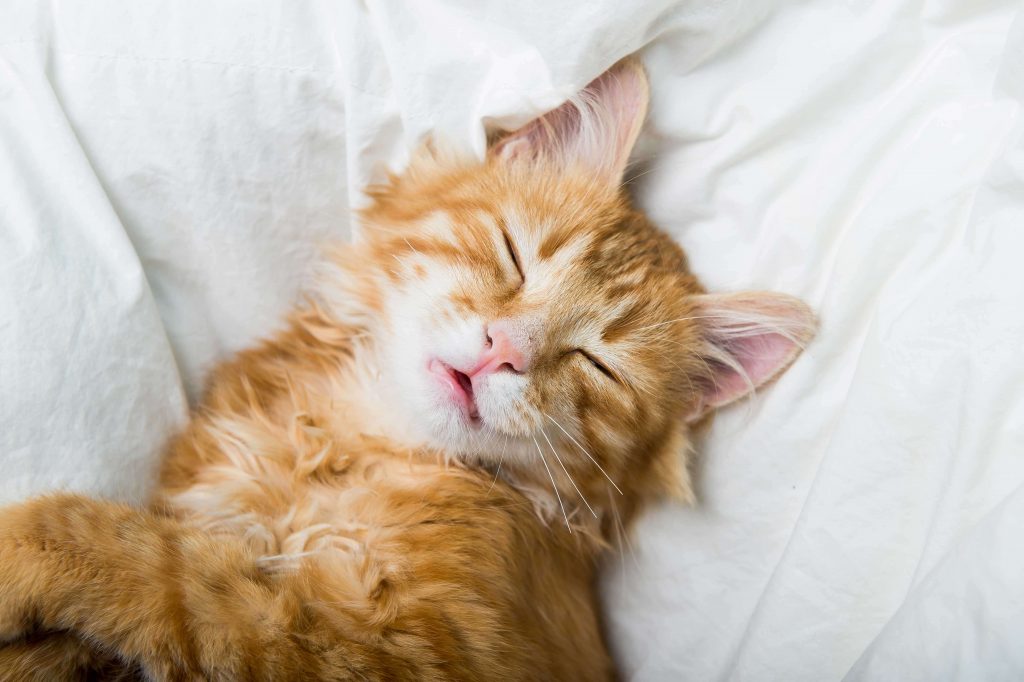
Cat trembles in its sleep
It’s not unusual for your cat to tremble in its sleep. Much like twitching, this is one of the side effects that occurs during certain sleep phases. Cats sometimes tremble before they fall asleep: basically, it’s a sign that their muscles are relaxing and they’re going into rest mode. These are the “final tremors” before your cat enters the land of dreams. So it’s all harmless and there’s no reason to worry about your furry friend! However, if your cat continues to tremble over a longer period of time or even after it wakes up, you should start observing them more closely. How are they behaving? Are they exhausted and apathetic? Are they not getting up from their sleeping spot at all, not even to eat? If the trembling occurs more frequently and your kitty is behaving unusually, it’s a good idea to contact
your vet and maybe even take your cat there straight away!
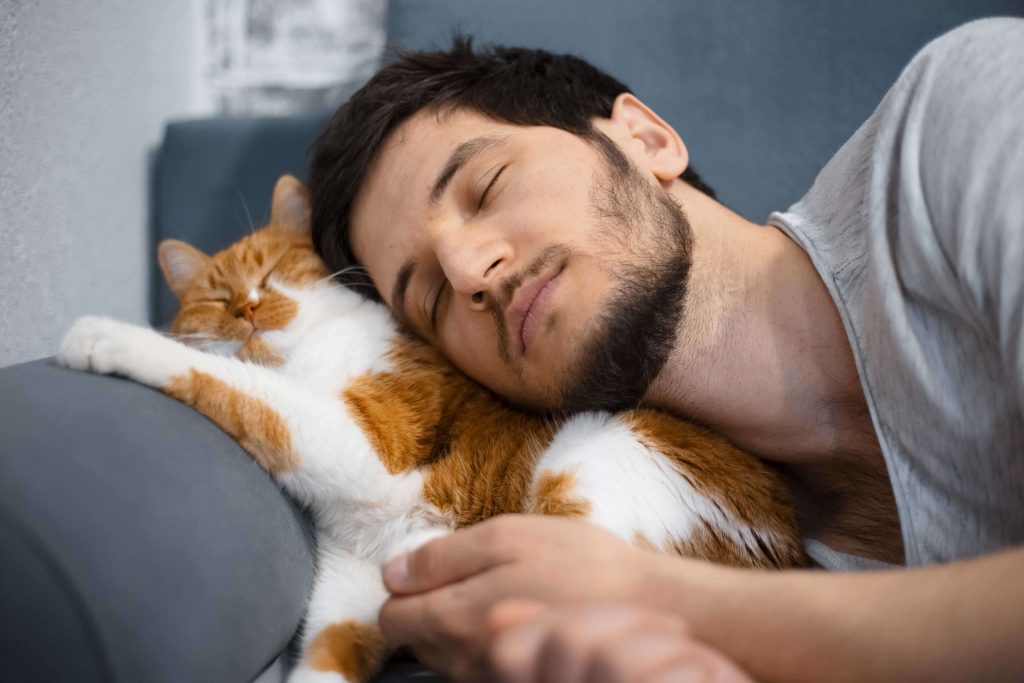
What’s so special about cats’ sleep?
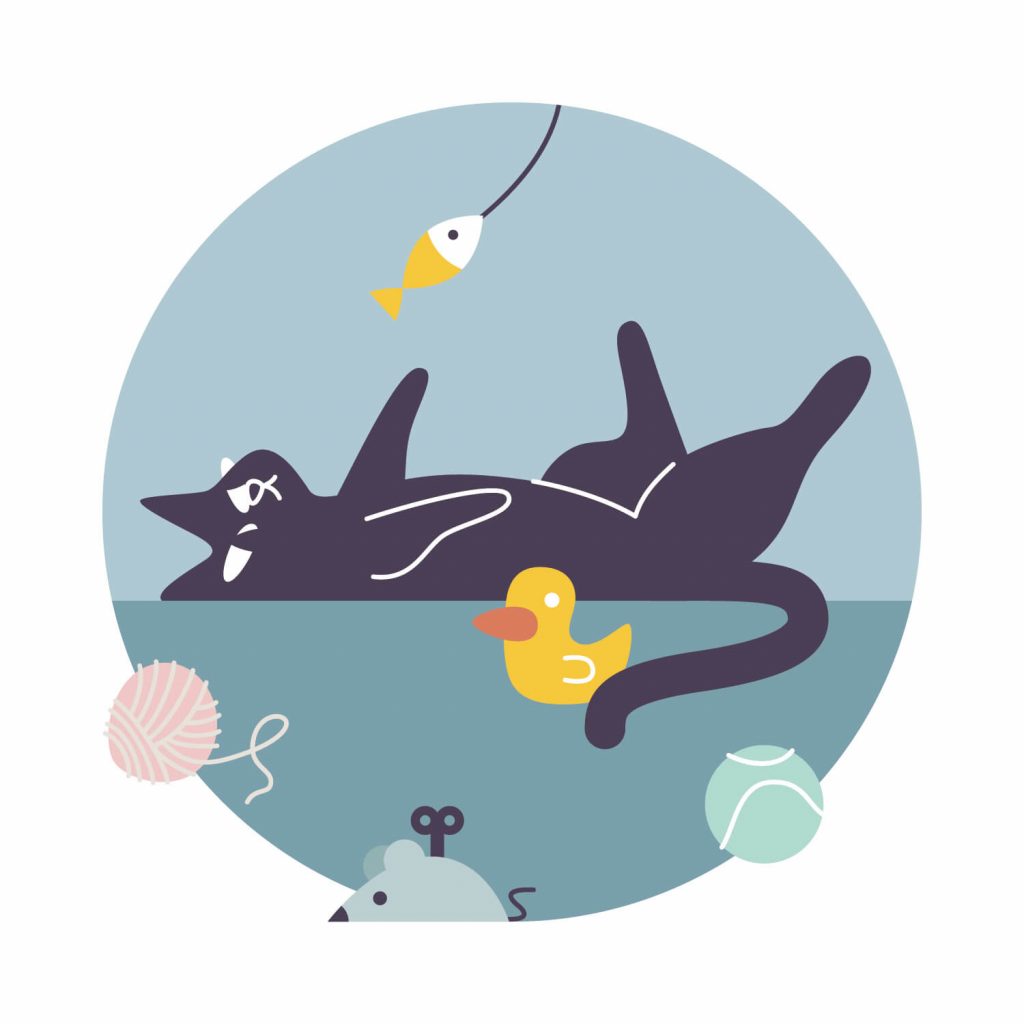
The special thing about cats’ sleep is their ability to adapt flexibly to their environment, even when
they’re resting. To keep their energy levels in balance, a short nap is sometimes all a cat needs to fully recharge their batteries. Your cat will close their eyes and have a quick light catnap. Depending on their needs, however, cats can also have extensive sleep phases with truly deep sleep. In those instances, cats are able to totally relax and
regenerate. When they wake up, they’re fully rested and fit again. In fact, cats are able to switch from being asleep to being fully awake at lightning speed. Even when a cat is taking a nap, they’re still fully alert. They’re always
ready to react quickly and able to switch into active mode at the slightest noise. This skill makes cats incredibly successful hunters and also ensures their survival.
DID YOU KNOW…
… that your cat only sleeps deeply for four hours a day? Each deep sleep phase lasts only 5 to 10 minutes: Cats are always ready!
Detecting diseases by observing sleep behaviour
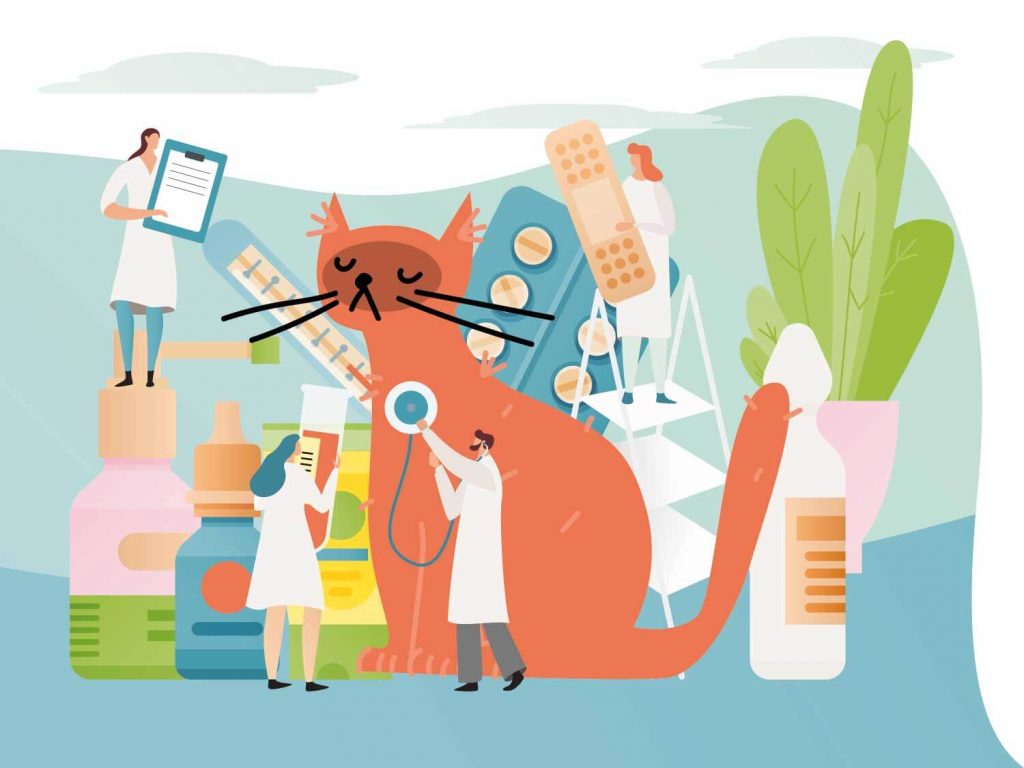
Changes in your cat’s sleeping behaviour can indicate the presence of an illness. Is your cat sleeping more or less than usual? Increased sleeping, sleeplessness or unusual sleeping patterns can be the first signs that your cat
isn’t feeling well, is stressed-out or in pain. Changes in sleeping behaviour can also be a sign that your cat is ill. Instead of playing, does your cat just listlessly retreat to their cuddly corner to sleep? This might mean their immune
system is out of balance. If your cat’s defences are weakened or restricted, it means their body’s immune system will also be weakened. Without these stable defence mechanisms, your cat will be more susceptible to infections. When this happens, our furry friends tend to fall ill more quickly.
Recognising sleep problems in cats
It’s possible to recognise whether your cat has sleeping problems by looking out for various signs:
- 1. Tiredness and lack of interest: If your cat seems tired and uninterested all the time, this could mean they’re not getting enough restful sleep.
- 2. Altered number of hours of sleep: In this case, the number of hours your cat sleeps deviates significantly from their previous sleep pattern. In other words, your cat will suddenly sleep much more or much less than before.
- 3. Restless sleep: If your cat is unable to settle down, or if it tosses and turns in its sleep, wakes up frequently and moves around constantly, this means that they’re very tense and restless.
Recognising and treating sleep deprivation in cats
How can you recognise whether your cat is suffering from a lack of sleep? And how can you treat the symptoms of sleep deprivation? When cats suffer from a lack of sleep, it can be a sign that something is really bothering them, plus it can be caused by a wide variety of illnesses. Illnesses can affect a cat’s sleep patterns and cause the quality of their sleep to suffer. For example, cats that get too little sleep will likely be very tired, listless, irritable or even aggressive. They’ll also often display changed eating habits and patterns. This is why it’s very important to closely
monitor changes in your cat’s sleeping behaviour and consult a vet if necessary. Your cat’s doctor will examine your furry friend thoroughly and recommend an appropriate treatment so that you’ll all be able to sleep well again.
Can cats dream?

Yes, cats can dream! Just like us humans, cats go through different sleep phases while they sleep, including the REM phase, which is characterised by intense dreaming. Experts assume that cats process experiences in their dreams, just like us humans. Dreaming helps them organise their thoughts and draw connections between all the things they experienced while awake; these things are “relived” in part and then stored. However, it’s also possible for cats to dream about events they haven’t actually experienced yet. When cats dream, certain areas of their brain become very active, for example the amygdala and the hippocampus. These areas control emotions and memory. As we all know, dreams can feel so real that the cat’s whole body will relive each individual scene with full intensity.
NOTE:
Please do not wake cats up when they’re sleeping! They need their rest. Save your affection for when they’re awake!
FAQs – Cat sleep
Cats tend to sleep a lot on account of the fact that they’re predators. Compared to herbivores, carnivores have fewer predators threatening them and don’t have to spend as much time hunting for food.
Adult cats usually sleep 12 to 16 hours a day, while kittens tend to sleep a few hours longer than that, at least right after they’re born. Just like human babies, newborn kittens sleep pretty much around the clock in
the first few weeks: these little fur balls actually spend more than 20 hours a day just sleeping.
On average, an adult cat should sleep 12 to 16 hours a day. However, the amount of sleep can
vary greatly. Depending on their age, health, activity and environment, your kitty might need more or less sleep.
There are a number of reasons why your cat might meow in its sleep. When cats dream, they often make associated sounds. During sleep, all of the things they experienced that day are processed by the brain and stored accordingly.
There are a number of reasons why your cat might meow in its sleep. When cats dream, they often make associated sounds. During sleep, all of the things they experienced that day are processed by the brain and stored accordingly.
Yes, cats can dream! Just like us humans, cats go through different sleep phases in which they dream intensively. Experts assume that cats process experiences from everyday life when dreaming, just like humans.
A change in sleeping behaviour can indicate that your cat has sleeping problems. Increased sleeping, sleeplessness or unusual sleeping patterns can be signs that a cat is not feeling well, is stressed or is ill.
Illnesses can affect your cat’s sleeping behaviour to such an extent that they end up suffering from a lack of sleep. A cat with too little sleep might be very tired and listless, irritable or aggressive and might also show altered eating behaviour.
When your cat is sleeping, you should refrain from doing anything to wake them up, and that includes petting them! Cats need their sleep to regenerate. Just like you, they recharge their batteries when they sleep. When your little fur ball wakes up naturally, it will be fit again and all the happier to cuddle.
